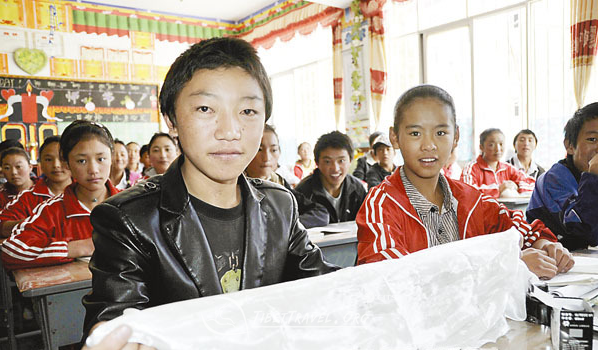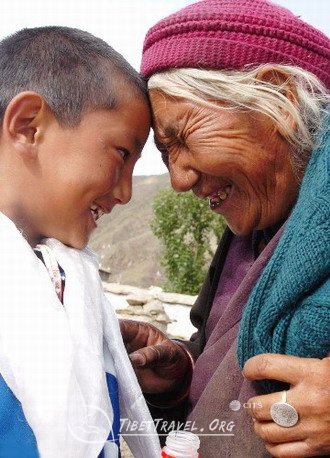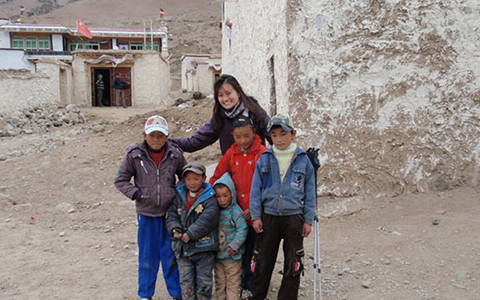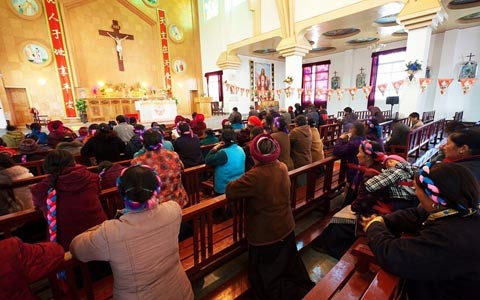
free education and local welfare favoring Tibetans
People have Tibet travel always keep an eye on the locals' daily life as well as the unique scenery. CRI reporters recently visited a free education program launched by the Sichuan provincial government in southwest China's Tibetan communities. Let's see how it works.
21-year-old Xiao Fang, an ordinary Tibetan girl, became a celebrity in her village recently. As one of the first students of a state-run free educational program favoring Tibetan children, Xiao Fang graduated, found a job, and settled down in a big city this summer.

"The schoolmasters took all factors into consideration, including our intentions, our level of education and the employment outlook. Finally, we were allowed to major in electric locomotives even though it's a traditionally male-dominated department. Then I was recommended as an intern for the local subway company. After graduation I started working there. And now I am a certified train driver. I want to thank this program. Without it, it would have been impossible for me to get this job, which will give me a stable life and a foreseeable future. It's a life-changing program."
The hometown of Xiao Fang is a mountain village called Sezu located in a Tibetan Autonomous Prefecture in southwest China's Sichuan Province. Villagers here hold a long-cherished dream of having a look at the outside world. But it's not easy to fulfill. Due to poverty and traditional customs, teenagers, especially girls, usually start farming, or even get married, after finishing middle school. They then spend their life the same way their parents did. To change this situation, the provincial government launched a free education program in the Tibetan Prefecture in 2009 which provides three-year vocational education in addition to the existing nine-year compulsory education. 30,000 Tibetan teenagers have benefited. Xiao Fang is one of them.

Jizeming, Xiao Fang's uncle, says the program helps the student and the family.
"Since she attended this program and found a job after graduation, her family has benefited from it a great deal. Previously, her family was in economic trouble. Her father was handicapped and couldn't work. After she started earning money, she began supporting her family. Everyone in the neighborhood praises the righteousness of this policy."
The provincial government pays more than 8,000 yuan, or around 1,500 US dollars, for each student every year, covering their tuition fees, textbooks and other incidental expenses. These students also enjoy living subsidies and clothing allowances, something assuages their family's fears about living away from home. What's more, the schoolteachers are very attentive.
Guo Xiaohua, director of the administration office of Chendu Zhonghe vocational school, introduces how they help the Tibetan children to adapt to their new life.
"To help these students adapt, we let them choose their favorite teachers to be their personal tutors. These tutors take care of their students in every way. They direct them in study and in life, invite them to their homes for the holidays and plan trips together. They become friends with the students, helping the students feel at home."
More than 200 Tibetan students are studying in Guo Xiaohua's school. They major in seven different subjects. The most popular ones are accounting, mechanics and pre-school education. Besides professional courses, they also enjoy a rich extracurricular schedule.
Guo Xiaohua explains.
"On the weekends, we provide many optional courses such as psychology, Mandarin and secondary major courses. What's more, they learn law, history, the importance of a unified country and health. They share dreams with one other."
Gradually, these Tibetan students learn to speak Mandarin, experience different cultures, and extend their horizons.
20-year-old Liu Yang began her own fruit store on the campus and hired several schoolmates as clerks. They all earn money this way.
"I thought I should prepare myself for the future. So, I started this business. Some classmates joined me. We've learned a lot from it. The most important thing we learned is how to manage our money. With the profit, we paid the rent, and each of us has earned more than 200 yuan."
Fu Ming, director of this program, speaks of the efficiency of is program.
"Through helping the Tibetan youth to acquire skills, we can increase the average education level of the local people. So, we borrow rich education resources from the developed areas and enroll as many Tibetan children as possible in this program. This way they can enjoy education and obtain better access to employment. This helps the whole society maintain long-term stability."
"These Tibetan students come here to receive modern education, and after they graduate they can spread what they learn to more people back in their communities. Who knows, they might become future leaders in certain areas. But before that, they must be competent at what they're doing."
Fu Ming also says that to keep the program stable they still have much work to do. The most important task is building a network to employ the graduates.
"The key to the sustainability of this program is to make sure its graduates can find satisfying jobs. Otherwise, it won't last long. However, there are still some misunderstandings about job-hunting. For example, the graduates only desire stable jobs such as civil servants, teachers, doctors or nurses, rather than working in private enterprises.
Well, those who need special care are not only youngsters, but also the elderly. Hongyuan County, located in the northwest part of Sichuan Province, is a region where the Tibetan ethnic and Qiang ethnic groups live together with Han Chinese. This county was named by Premier Zhou Enlai in the 1960s, meaning "the prairie where the Red Army passed through during the Long March." Right beside the eastern edge of Qinghai-Tibet Plateau, Hongyuan is also an important portal along the way for our CRI reporters' Sichuan-Tibet trip. Besides the beautiful snow mountain views and the clear blue skies, we also found heartening spectacles and interesting stories to tell. This one is about a local welfare center, which houses nearly 60 older people.
The first sight of the old age home is a set of two-story buildings, well-decorated in traditional colors and designs that houses 59 senior citizens. You can hear them laughing, talking and chanting from time to time, because most of them are Buddhists.
Sixty seven-year-old Yang Po has lived here for three years. She seems very pleased for what she has now.
"We are taken care of very well here. There are three meals each day. Meat is served everyday. For breakfast we have porridge and eggs. In the afternoon we have noodles or rice."
"I came to live here in 2008. I have a daughter. But she's married into her husband's home. So she cannot take care of me."
Most of the residents here enjoy national endowment insurances, which means their food, clothing, medical care, housing and burial expenses are all taken care by the municipal budget. Seven of them live here because they suffer from Kaschin-Beck disease, a painful bone and joint disease which causes malformed limbs. Yang is one of them. In order to help these sufferers to move more conveniently, the center has equipped each of them with a wheelchair. Yang likes hers very much.
"This is my wheelchair. The civil affairs bureau gave it to me. I can move more conveniently than before with its aid."
Besides the accommodations for as many as 80 people, the center has many recreational facilities, such as TV room, chess and poker room, gym, and even a prayer wheel, which is the traditional way for Tibetan Buddhists to send their wishes and respect to Buddha. It is Yang Po's favorite.
"We play mahjong, Chinese chess, or card games, whatever we like. Also we have this prayer wheel. We chant and pray here everyday. It's very satisfying."
Seventy five-year-old Kangbadaji was a monk before he joined the center. He never married and therefore he has no family or relatives. But he has made friends here.
"Life is totally different now. People cook for me, clean for me and care about me everyday. I never feel lonely here."
Each resident here enjoys 300 yuan, or 50 US dollars allowance, and another 60 yuan a month as pocket money. Five nurses, three chefs and one chief director are here to take care of their daily lives.
Xu Mingyu, head of the Civil Affairs Bureau of Hongyuan County, oversees the center's medical care policy.
"If the elders feel uncomfortable, we send them to the hospital immediately for check-ups and to make sure they are treated. Besides, we give them routine medical examinations every month to prevent underlying illnesses."
The center was built in 2008. It cost more than six million yuan, or one million US dollars donation, both from the government and the charitable organizations. Nearly 400 vagrants and beggars also benefit by staying here.

With exceptional passion and outstanding leadership, Mrs. Catherine has dedicated herself to Tibet inbound tourism and China tour for 15 years. As one of the handful females who see great potential of Chinese inbound tourism, Catherine has made great contribution to promoting Tibet tourism and enhancing the employment of Tibetans and prosperity of local Tibetan community.
Over the years, she travelled overseas with Tibet Tourism Bureau many times to promote Tibet tourism. Currently, Catherine works as the marketing director of Tibet Vista, an opinion leader behind the whole team of Tibet Vista.
Related Articles & Posts

Latest Tibet Travel News

Tibet Vista: A Social Responsible Tour Organizer
Aug 14,2023

Tibetan Monks Debate in Drepung Monastery
Jun 10,2023

Tips for Traveling to Tibet in Spring
Feb 17,2022

Snow Will Hit Qinghai-Tibet Plateau
Feb 17,2022


.jpg)




0 Comment ON "free education and local welfare favoring Tibetans"